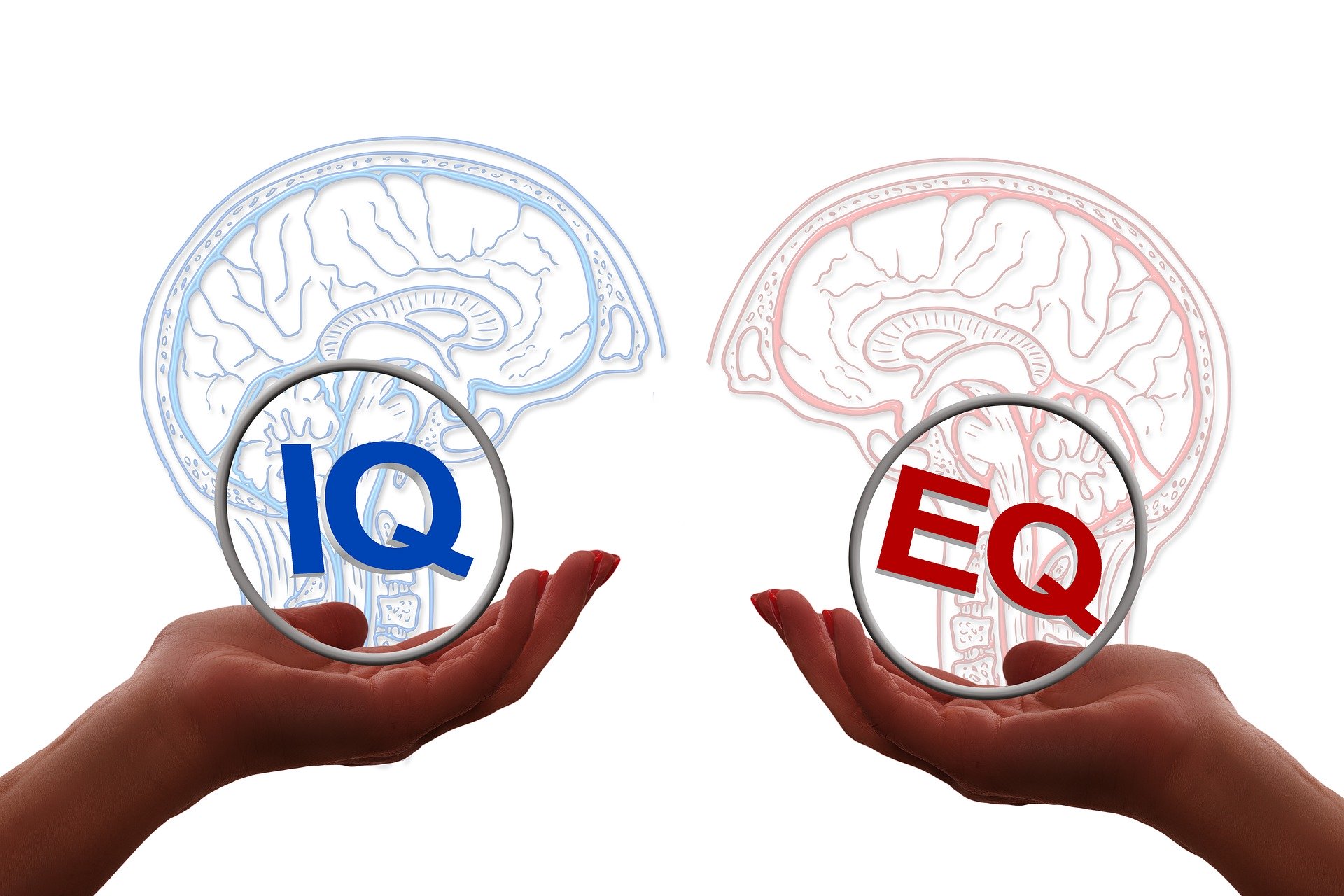Emotional Intelligence, or EQ, has emerged as a critical factor in driving business growth by enabling organisations to develop more meaningful customer relationships.
In today’s ever-changing business environment, organisations seek innovative ways to differentiate themselves from their competitors. While many companies focus on improving their products, services, or technology, the key to long-term success lies in understanding and engaging with customers at a deeper level.
This article will explore the importance of EQ in business and provide examples and statistics from countries worldwide to demonstrate its impact.
What is Emotional Intelligence?
Emotional Intelligence is the ability to identify, understand, and manage one’s own emotions, as well as the feelings of others. It involves being aware of and controlling one’s feelings, empathising with others, and using this knowledge to guide decision-making and behaviour. Emotional Intelligence has four key components:
- Self-awareness: The ability to recognise and understand one’s emotions and how they affect thoughts, behaviour, and relationships.
- Self-management: The ability to regulate and manage one’s emotions, thoughts, and behaviour in response to different situations and challenges.
- Social awareness: The ability to understand and empathise with the emotions, needs, and perspectives of others.
- Relationship management: The ability to use emotional Intelligence to build and maintain positive relationships with others, including effective communication, conflict resolution, and collaboration.
Emotional Intelligence is increasingly recognised as essential in personal and professional success, particularly in leadership roles. Studies have shown that individuals with higher levels of emotional Intelligence are more effective leaders, better able to navigate complex social situations, and more likely to succeed in their personal and professional lives. Developing emotional Intelligence is a lifelong process that can be improved through self-reflection, mindfulness, and practice.
The Importance of Emotional Intelligence in Business
There are several reasons why EQ is essential in business:
Improved customer relationships: EQ enables organisations to develop more meaningful connections with customers by understanding their needs, emotions, and motivations.
This helps companies create more personalised and engaging products, services and experiences that drive loyalty and advocacy.
Better employee engagement: EQ also plays a crucial role in fostering a positive work environment where employees feel valued and supported. This leads to higher engagement levels, increased productivity, and reduced turnover.
Happy customer-facing employees will also give a better image of the company and develop more empathy with customers so they feel valued.
More effective leadership: Leaders with high EQ can better communicate, motivate, and inspire their teams. They are also more adept at managing conflicts.
In addition, high EQ is thought to lead to improved innovation by better connecting with customers, their needs and values.
Enhanced decision-making: EQ helps leaders make more informed decisions by considering the emotional impact of their choices. This leads to more balanced and thoughtful judgments that consider the needs of all stakeholders.
Examples of EQ in Action
Several companies around the world have successfully leveraged EQ to drive business growth:
Consumer Goods:
Starbucks is known for its customer-centric approach, rooted in emotional Intelligence. The company’s baristas are trained to connect with customers personally, using their names and preferences to create a more personalised experience.
Zappos, the online shoe retailer, has built a reputation for exceptional customer service driven by a culture of empathy and emotional Intelligence. The company encourages employees to go above and beyond for customers, often exceeding expectations and creating a loyal customer base.
Patagonia, the outdoor clothing company, has built a brand around sustainability and environmentalism, which resonates with customers who share these values. By tapping into customers’ emotions and beliefs, Patagonia has been able to differentiate itself from competitors and build a loyal following.
Airbnb is a company that has revolutionised the hospitality industry by offering unique and authentic experiences for travellers. They have done this by leveraging emotional Intelligence to build trust and connection between hosts and guests. Through its platform, Airbnb encourages hosts to share their stories and personal touches, which helps to create a more personalised experience for guests.
Salesforce is a software company with a reputation for exceptional customer service and engagement. They have done this by leveraging emotional Intelligence to create a culture of empathy and understanding.
Salesforce has a program called “Ohana,” which means “family” in Hawaiian, designed to create a sense of community and support for employees. The company also encourages employees to give back to their communities through volunteer work and charitable giving, which helps to create a sense of purpose and fulfilment.
The healthcare industry is an excellent example of how emotional Intelligence can drive customer experience (CX) and business growth. Patients often have high levels of stress, anxiety, and fear when seeking healthcare services, making it essential for healthcare providers to understand and empathise with their emotions.
One healthcare provider that has successfully leveraged EQ to drive CX and growth are HCA Healthcare, which operates more than 185 hospitals and 119 surgery centres in the United States and the United Kingdom. The company has implemented several initiatives to enhance the patient experience, including a patient-centric approach that prioritises emotional connections with patients and their families.
HCA Healthcare also uses data analytics to measure and improve patient satisfaction levels. For example, the company’s Patient Experience Index (PXI) measures patients’ emotional responses to their care experience, including their trust, confidence, and compassion. By focusing on emotional Intelligence, HCA Healthcare has been able to differentiate itself from competitors and achieve high patient satisfaction and growth levels.
These first examples demonstrate how emotional Intelligence can be applied in different industries and contexts to drive business growth and success. By prioritising empathy, understanding, and connection, companies can differentiate themselves from their competitors and create meaningful relationships with customers and employees.
Let’s now look at other areas impacted by improved EQ.
[easy-tweet tweet=”Companies can differentiate themselves from their competitors by prioritising empathy, understanding, and connection. ” hashtags=”#EQ, #EmotionalIntelligence, #CEO”]
Areas impacted by improved Emotional Intelligence
EQ and remote working: The COVID-19 pandemic has accelerated the trend towards remote work, making it more critical than ever for organisations to develop emotional intelligence skills to manage distributed teams effectively. Research shows that remote workers are more likely to experience loneliness, isolation, and burnout, making it essential for managers to understand and address their emotional needs.
One company that has successfully implemented EQ in remote work is Buffer, a social media management platform with a fully distributed team of more than 80 employees worldwide. Buffer has implemented several initiatives to promote emotional Intelligence, including a “Culture of Feedback” that encourages open and honest communication, empathy, and support.
Buffer also uses video calls and other digital tools to create a sense of connection and belonging among remote team members. By prioritising emotional Intelligence, Buffer has maintained high levels of employee engagement, productivity, and growth.
EQ and entrepreneurship: Entrepreneurs require high emotional Intelligence to succeed. They must manage stress, uncertainty, and setbacks while maintaining a positive mindset and strong relationships with customers, investors, and partners.
One entrepreneur who has leveraged EQ to drive business growth is Sara Blakely, the founder of Spanx, which produces women’s shapewear and other undergarments. Blakely has described emotional Intelligence as a critical factor in her success, enabling her to overcome obstacles and build strong relationships with customers and partners.
Blakely has implemented several initiatives to promote EQ within her company, including a “Culture of Fun” that encourages creativity, collaboration, and positivity. She has also been vocal about the importance of failure and vulnerability in entrepreneurship, using her experiences to inspire and connect with others.
EQ and diversity, equity, inclusion: Emotional Intelligence is essential for promoting workplace diversity, equity, and inclusion (DEI). Leaders with high EQ can better understand and empathise with the experiences and perspectives of employees from diverse backgrounds, creating a more inclusive and supportive culture.
One company that has successfully leveraged EQ to drive DEI is Salesforce (again). In addition to the initiatives mentioned, Salesforce has implemented several strategies to promote DEI, including a “Chief Equality Officer” role that focuses on ensuring equality and opportunity for all employees.
Salesforce also uses data analytics to measure and track progress towards DEI goals, including employee representation, pay equity, and employee engagement.
By prioritising emotional Intelligence, Salesforce has created a more diverse and inclusive workplace, which has led to higher levels of employee engagement.
Benefits of EQ in business
Expanding on the importance of emotional intelligence in business, there are several key benefits that organisations can expect to see:
Improved customer loyalty: By understanding and engaging with customers on a deeper level, organisations can create more personalised experiences that drive loyalty and advocacy. Customers are more likely to remain loyal to a company that values them as individuals and understands their needs and emotions.
Increased employee engagement: Emotional Intelligence is essential in fostering a positive work environment where employees feel valued and supported. When employees feel that their emotions and needs are understood and prioritised, they are more likely to be engaged and productive.
More effective leadership: Leaders with high emotional Intelligence can better communicate, motivate, and inspire their teams. They are also more adept at managing conflicts and driving innovation, which can lead to better business outcomes.
Enhanced decision-making: Emotional Intelligence helps leaders make more informed decisions by considering the emotional impact of their choices. This leads to more balanced and thoughtful decisions that consider the needs of all stakeholders, not just short-term financial goals.
[easy-tweet tweet=”Emotional Intelligence is essential in fostering a positive work environment where employees feel valued and supported. ” hashtags=”EQ, EmotionalIntelligence, CEO”]
Statistics on the Impact of EQ
If you are still hesitating about the impact of EQ in the business environment, despite all these examples, then here are some statistics that confirm its value:
- A study by the Harvard Business Review found that companies with a strong customer-centric culture are 60% more profitable than those without.
- According to a report by the World Economic Forum, emotional Intelligence will be one of the top ten skills required in the workplace by 2020.
- A study by the University of Maryland found that Emotional Intelligence is a crucial predictor of job performance, with high-EQ individuals performing better than those with low EQ in technical and non-technical roles.
- A study by the Center for Creative Leadership found that the most successful leaders are emotionally intelligent and able to build strong relationships with their teams.
- According to a study by TalentSmart, people with high EQ earn an average of $29,000 more per year than those with low EQ.
- A study by Gallup found that companies with high employee engagement levels are 21% more profitable than those with low engagement levels.
- A study by the Hay Group found that companies with a strong focus on leadership development have 12 times higher financial performance than those without.
These are just a few of the results found by numerous companies that studied the impact of EQ on their business. Impressive numbers, no?
[easy-tweet tweet=”A study by the HBR found that companies with a strong customer-centric culture are 60% more profitable than those without. ” hashtags=”EQ, EmotionalIntelligence, CEO”]
Leaders who have championed a customer-centric culture within their organisations
Many company directors have championed customer-centric cultures within their organisations. Here are a few examples:
Jeff Bezos – Amazon: Jeff Bezos is always mentioned when we discuss adopting a customer-first strategy. He has been a strong advocate for customer-centricity since the founding of Amazon. He is famously quoted as saying, “The most important single thing is to focus obsessively on the customer. Our goal is to be earth’s most customer-centric company.”
Under Bezos’ leadership, Amazon has prioritised customer experience, investing heavily in initiatives such as free two-day shipping, personalised recommendations, and customer reviews. This customer-centric approach has helped Amazon become one of the most successful companies in the world.
Amazon’s net sales have grown from $74.45 billion in 2013 to $386.06 billion in 2020, a CAGR of 23.4%. Additionally, Amazon’s customer satisfaction scores have consistently been among the highest in the industry, with a score of 79 on the American Customer Satisfaction Index (ACSI) in 2022, slightly down from its high of 86 just five years ago.
Satya Nadella – Microsoft: Since taking over as CEO in 2014, Nadella has worked to shift the company’s focus towards a more customer-centric approach. He has prioritised empathy and understanding, stating, “We need to be able to put ourselves in the shoes of the people we are serving.”
Under his leadership, the company has made significant strides in improving its customer experience, simplifying its product offerings, investing in cloud computing, and introducing new customer-focused initiatives such as Microsoft Teams.
This has had an impressive impact on Microsoft’s annual revenue, which increased by over 17% these past two years.
Tony Hsieh – Zappos: Tony Hsieh, the former CEO of Zappos, was a well-known advocate of a customer-centric culture. He famously stated, “We believe that customer service shouldn’t be just a department; it should be the entire company.”
Under his leadership, Zappos built a reputation for exceptional customer service, offering free shipping and returns, 24/7 customer support, and a focus on creating personalised customer experiences.
In 2009, Zappos was acquired by Amazon, but the company has continued to operate independently and focus on delivering a superior customer experience. According to a survey conducted by ForeSee, Zappos has consistently had the highest customer satisfaction scores in the online retail industry, with a score of 89 on the ACSI in 2020.
Richard Branson – Virgin Group: The Virgin Group is a conglomerate of companies that has built its brand around a commitment to delivering exceptional customer experiences. The company’s customer-centric approach has helped it become a leader in various industries, including airlines, music, and telecommunications.
According to Forbes, Virgin Group’s brand is worth $5.6 billion as of 2021, and the company’s focus on customer satisfaction has helped it to achieve solid financial results across its various businesses.
Brian Chesky – Airbnb: Chesky, the co-founder and CEO of Airbnb, has championed a customer-centric approach since the company’s founding. He has prioritised creating personalised customer experiences, stating, “We don’t want to be just a place to stay. We want to be a platform for experiences.”
Under Chesky’s leadership, the company has built its business around delivering customers a unique and personalised travel experience. According to Airbnb, the company has hosted over 500 million guests since its founding in 2008, and it has helped to create over 300 million local jobs and generate over $100 billion in economic impact.
Airbnb has recently prioritised creating a sense of community among its users, investing in initiatives such as local experiences, neighbourhood guides, and personalised recommendations.
Indra Nooyi – PepsiCo: Indra Nooyi, the former CEO of PepsiCo, has been a strong advocate for creating a customer-centric culture. She emphasised the importance of understanding customers’ needs, stating, “The customer is not a moron; she’s your wife.”
Under her leadership, PepsiCo has prioritised creating healthier products, investing in sustainability, and creating marketing campaigns that resonate with customers.
Tim Cook – Apple: Cook, the CEO of Apple, has defended a more customer-centric culture since taking over from Steve Jobs in 2011. He has focused on creating a seamless customer experience, stating, “Our goal at Apple is to make amazing products that enrich people’s lives.”
Under his leadership, Apple has continued to innovate and create products that prioritise user experience, including the iPhone, iPad, and Apple Watch.
Apple has always strongly emphasised delivering a superior customer experience, which has helped the company become one of the most valuable brands in the world. According to Interbrand, Apple’s brand will be worth $482,215 mio in 2022, up 18% from the previous year, making it the most valuable brand in the world. Additionally, Apple’s customer loyalty has been among the highest in the industry, with a Net Promoter Score (NPS) of 68 in 2023, according to Trustmary.
These companies have all demonstrated that a customer-centric culture can lead to tremendous success in terms of financial results and customer loyalty. By placing the customer at the centre of everything they do, these companies have been able to differentiate themselves from their competitors and build strong relationships with their customers.
As the business landscape continues to evolve, it will be increasingly important for companies to adopt a customer-centric approach to remain competitive and achieve sustainable growth. And an essential part of that is customer understanding and empathy, coming from a strong EQ.
How to Build EQ within Your Organisation
Hopefully, you are convinced of the importance of EQ inside a business to improve the lives of employees and the customers who buy their products and services. Here are some strategies to consider:
- Prioritise empathy and understanding: Make a conscious effort to understand the emotions and needs of your customers and employees. Use customer feedback, surveys, and employee engagement programs to gather insights and create a more personalised experience.
- Foster a positive work environment: Create a culture that values empathy, emotional Intelligence, and work-life balance. This includes offering support for mental health, promoting transparency, and encouraging a sense of community and purpose.
- Train leaders and employees: Provide training and development opportunities to help leaders and employees build their emotional intelligence skills. This can include workshops, coaching, and mentorship programs.
- Measure emotional Intelligence: Use tools such as assessments, surveys, and feedback loops to measure emotional Intelligence within your organisation. This can help identify areas for improvement and track progress over time.
By implementing these strategies, businesses can build emotional Intelligence into their culture and operations, leading to improved business outcomes and long-term success.
In Conclusion
To summarise, Emotional Intelligence is a critical skill for businesses in the 21st century. By prioritising empathy, understanding, and connection, organisations can create more meaningful relationships with customers and employees, leading to increased loyalty, engagement, and business success.
Through strategies such as prioritising empathy and understanding, fostering a positive work environment, training leaders and employees, and measuring emotional Intelligence, businesses can build emotional Intelligence into their culture and operations, leading to improved business outcomes and long-term success.
The examples and statistics presented in this article clearly demonstrate the impact of EQ in business and underscore the need for organisations to prioritise emotional Intelligence as a critical driver of success. I hope they have convinced you to review how good your company’s EQ is.











